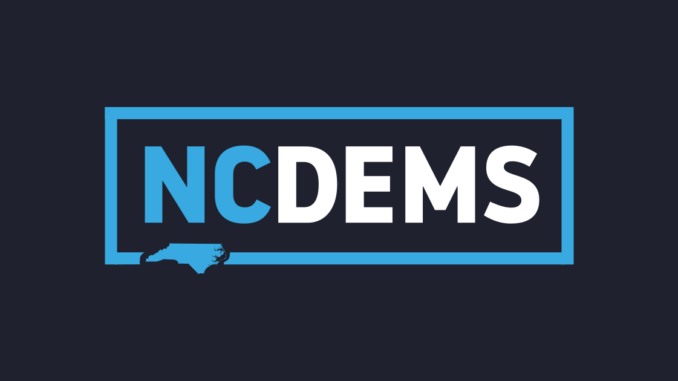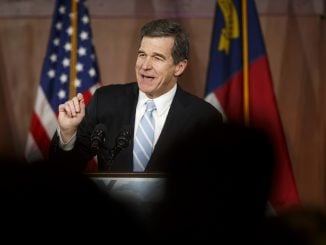
RALEIGH — The North Carolina Democratic Party has filed a complaint challenging the addition of the We The People party to the state’s November ballot after the North Carolina State Board of Elections approved the party’s certification on July 16.
The lawsuit seeks to reverse the North Carolina State Board of Elections (NCSBE) decision, prevent the We The People Party (WTP) from appearing on the 2024 ballot, and obtain a declaratory judgment that the board’s decision was unlawful. The North Carolina Democratic Party (NCDP) filed both an emergency motion for a preliminary injunction and the complaint on July 25 in Wake County Superior Court.
The complaint alleges Robert F. Kennedy Jr., initially running as an independent presidential candidate, formed WTP to gain easier ballot access in North Carolina. The NCDP argues that WTP’s sole purpose was to get Kennedy on the ballot, which they claim is not a legitimate purpose for a political party under North Carolina law.
The NCSBE voted 4-1 to recognize WTP, with NCSBE Chair Alan Hirsch remarking he believed WTP’s formation amounted to “subterfuge” to circumvent stricter ballot access requirements for independent candidates (83,188 signatures by March 5) versus new political parties (13,865 signatures by June 1).
The NCDP claims this decision violates North Carolina law and could set a precedent allowing candidates to get around ballot access and campaign finance rules by forming “parties” solely to support their candidacies.
“The NCDP has an interest in competing fairly against other political parties and unaffiliated candidates in North Carolina. Allowing unaffiliated candidates to masquerade as political parties, as Kennedy and the WTP Party seek to do here, in violation of North Carolina law harms the electoral prospects of the NCDP and its candidates,” the NCDP’s complaint states.
Additionally, the NCDP argues it is harmed by having to “divert and expend additional resources to oppose WTP candidates the NCDP believes shouldn’t be on the ballot.”
North Carolina Republican Party Communications Director Matt Mercer posted on X that the NCDP filed the lawsuit to help its chances in the November elections.
“THERE THEY GO AGAIN! The @NCDemParty just filed a lawsuit to REMOVE a political party from the 2024 North Carolina ballot,” Mercer, who was previously editor-in-chief of North State Journal, said in a post. “Democrats are ONCE AGAIN abusing the Courts for no reason other than selfish political protection. THIS IS OUTRAGEOUS. What are they so afraid of?”
The NCSBE had delayed certifying third-party candidates for the November ballot. The Constitution Party and WTP were only recently certified eight days before the NCDP filed its complaint.
Another party, Justice For All, the party of presidential candidate Cornel West, was denied certification, and the party has since filed a lawsuit against the NCSBE.
The Justice For All (JFA) complaint raised concerns of alleged partisan interference in the petition process, citing objections to JFA’s certification brought to the NCSBE by the NCDP and Clear Choice Action, a group described in the lawsuit as created by Democrats to limit third-party candidates that is represented by Elias Law Group. JFA’s complaint suggests the NCSBE’s actions were influenced by these groups and states, “Plaintiffs are unaware of any effort by the NCSBE to investigate the Democratic operative’s conduct.”
Critics, including lawmakers, have speculated that the slow-walking of certifications was being done in order to protect President Joe Biden, who has since dropped out of his reelection bid and has endorsed Vice President Kamala Harris as the Democratic nominee.
The situation involving WTP and JFA are similar to the NCSBE’s past refusal to add the Green Party to the ballot. The Green Party sued, and a judge ordered the party to be added to the ballot and forced the NCDP to pay more than $6,500 in legal fees to the Green Party.
The NCSBE’s lack of progress in certifying parties who obtained more than the required number of signatures to qualify caught the attention of both Congressional oversight committee Republicans and lawmakers in the North Carolina General Assembly, who held a hearing on July 23.
The N.C. House Oversight and Reform Committee’s Committee Co-Chair Jake Johnson (R-Henderson) led the July 23 hearing, which Hirsch and NCSBE Executive Director Karen Brinson Bell attended via remote access. Andy Jackson, the director of the Civitas Center for Public Integrity at the John Locke Foundation, was also a witness and, in his prepared remarks, said the actions of the NCSBE “were entirely predictable based on the board’s partisan nature.”
Johnson noted in his opening remarks the existence of a strategy being used by Democrats nationwide to keep third parties off the November presidential ballot.
“Back in March, The New York Times highlighted the Democrat Party’s state-by-state efforts to deny ballot access to third-party candidates, including North Carolina,” Johnson said, adding that the same thing happened to the Green Party before a judge stepped in to rectify the situation.
The oversight hearing lasted more four hours, with Johnson saying in his closing remarks there would likely be another hearing.



